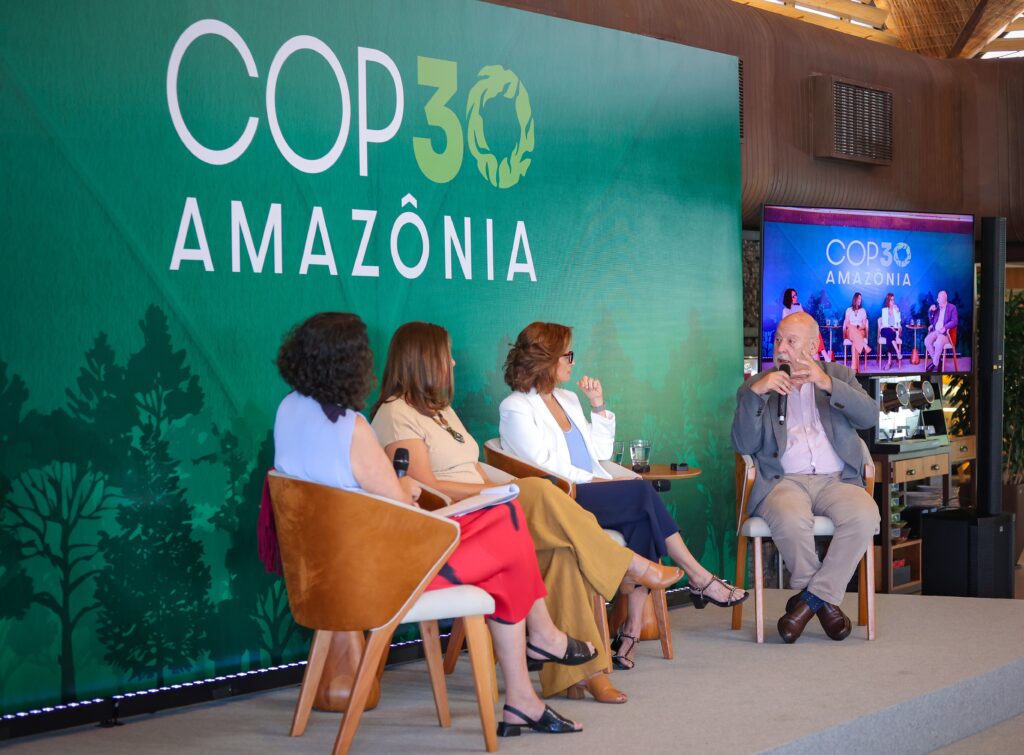
Foto: divulgação do evento
IMDS CEO discusses climate resilience and vulnerability in COP30 Amazon series seminar
The newspapers “O Globo” and “Valor Econômico” and the radio station “CBN” held the seminar “Climate resilience: the challenge of adapting to climate change“, an event that is part of the “COP30 Amazonia” meeting project. The CEO of the Institute for Mobility and Social Development (IMDS), Paulo Tafner, was present as a guest on the panel “How to increase the resilience of the most vulnerable?”, mediated by journalist Ana Lúcia Azevedo. In addition to the economist, the panel had the participation of the coordinator of the Laboratory of Geography, Environment and Health of the University of Brasilia, Helen Gurgel, and the partner in the Energy and Sustainability area of Rolim Goulart Cardoso Advogados, Maria João Rolim.
During the debate, Tafner addressed how extreme weather events can impact people’s daily lives and how these effects relate to existing public policies in Brazil. “Seeking to investigate public policy actions associated with climate events has become a priority for us,” commented the CEO of IMDS.
The topic was analyzed in the article “Social Policy and Resilience: A geospatial analysis of the impact of climate change on migration decisions among vulnerable agricultural producers“, cited by Paulo Tafner throughout the panel. The study in partnership with researchers Vinicius Diniz Schuabb (from Bocconi University, Italy) and Valdemar Neto (from Brazil’s FGV) evaluates how social policies can affect the resilience strategies of agricultural producing families impacted by climate change in the country. The interaction between income shocks caused by extreme droughts and the benefits of the Bolsa Família Program was investigated to understand whether these factors influence the migration decisions of highly vulnerable individuals.
According to the results, short-distance migrations within the municipalities of origin occur five times more often than long-distance migrations between municipalities. Social benefits can both increase and reduce the likelihood of individual migration, depending on the level of exposure to droughts. Individuals exposed to 1% of the most severe droughts tend, on average, to use the benefits to subsidize migration, while those exposed to the most severe 10% of droughts use the benefits in their resilience strategies, reducing migratory flow.
With this, it is evident that social assistance policies play a significant role in contributing to the resilience and coping decisions of rural populations in the face of the challenges imposed by extreme weather events. The article was the first part of the project “Income Transfer Programs and Socioeconomic Impacts of Natural Disasters“. Soon, the institute will publish a second part of the work, focusing on excessive rainfall and flooding, which, unlike the first phenomenon, is more concentrated in the urban environment.
In discussing the incentive programs associated with migration, Tafner pointed out that there are many documented experiences, such as the “Moving to Opportunity Program”. The initiative, implemented between 1994 and 1998 in the United States, aimed to offer families in poverty the opportunity to change their place of residence. However, as the economist explained, the results were only positive when the program underwent a redesign and provided technical advice from professionals. The redesign to prevent these families from moving to a place equal to or worse than the one they already lived in was carried out through a barrier clause that established that the beneficiary could not move to a place with a worse HDI than their own. “Public policy has to have this malleability of giving the right incentives and designs,” said the researcher.
Climate change impacts people’s lives, especially those in vulnerable situations. Therefore, it is essential to understand how these impacts occur and how we can promote collective actions and public policies to mitigate them. With this commitment in mind, IMDS will continue to produce and disseminate studies on the relationship between public policies and extreme weather events, contributing to the debate and the search for evidence-based solutions.